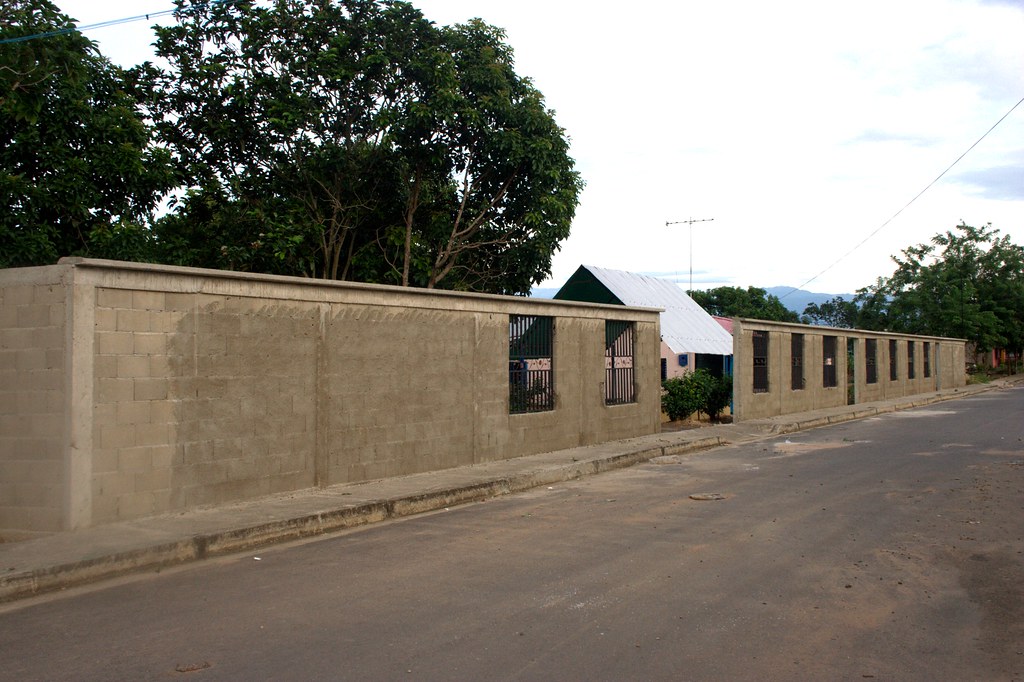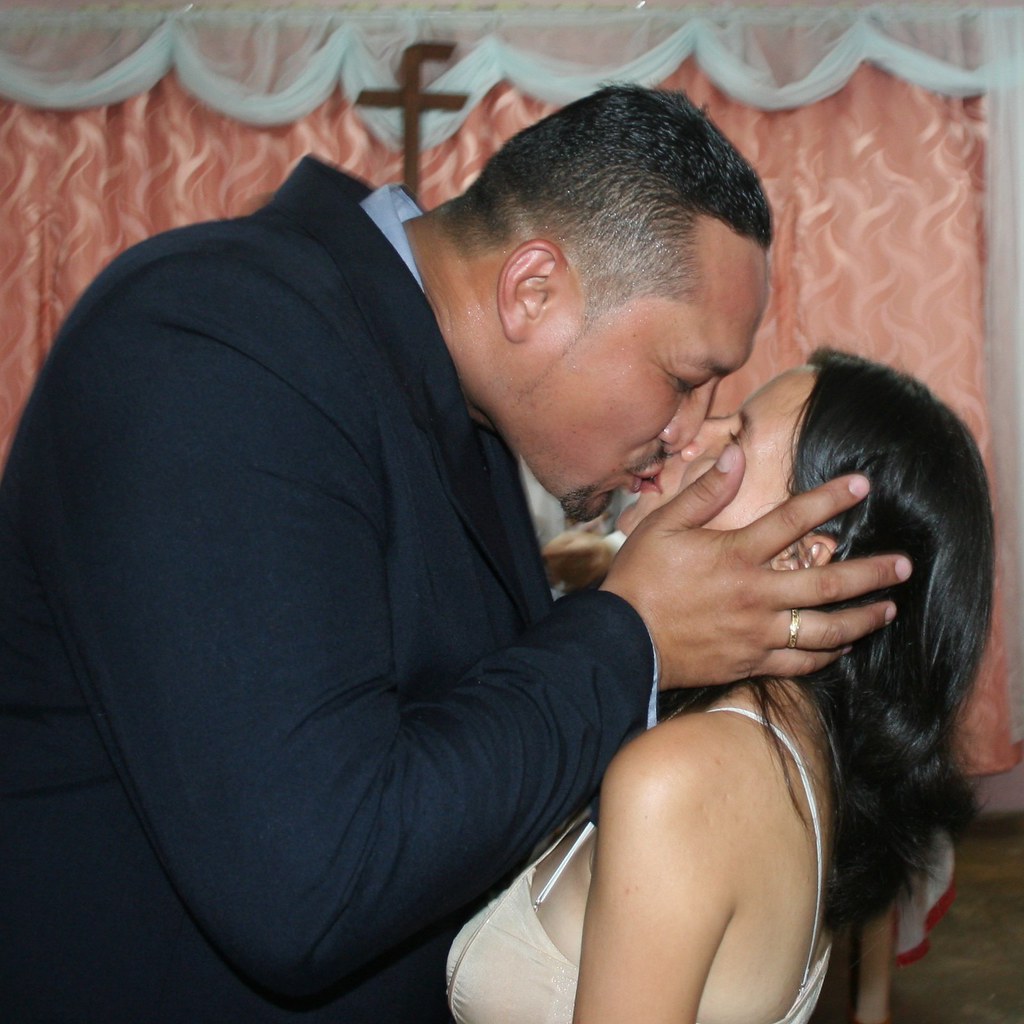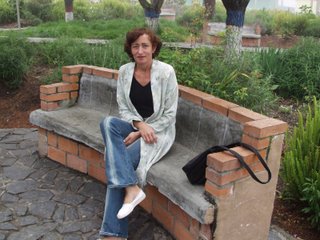
One of my favorite hymns is "Glorious Things of Thee are Spoken" by John Newton (he also wrote "Amazing Grace"). The first verse goes like this:
Glorious things of thee are spoken,Zion, city of our God.
He whose Word cannot be broken,
Formed thee for His own abode.
On the Rock of Ages founded,
What can shake thy sure repose?
By salvation's walls surrounded,
Thou may'st smile at all thy foes.
Of course we are by salvation's walls surrounded in La Caramuca, but now by a wall of masonry as well. It lacks only metal gates, which we expect to have installed in the next couple of weeks. The entire mission is now enclosed.
Despite a generous donation toward this project, it has strained our budget to continue. This has been due to the steadily rising costs of materials and labor in this inflationary economy. Nevertheless, we have pressed on for three reasons:- First, the more we improve the property, the more we must
control access to prevent petty theft and vandalism (somebody stole our
parrot a few weeks ago!). - Second, for the sake of the children. We have encouraged
them to visit us and use our property as a playground. But up to now we
have not been able to prevent them from doing so when we are absent and
therefore unable to supervise them. To avoid accidental injuries (and
there have been some close calls), we must establish a physical barrier. - Third, the wall gives the mission a more "institutional"
appearance and helps convince the community of our intention to serve
over the long term. Just down the block stands an empty building that
had been a Pentecostal church. It did quite a few good works in the
community for the two years that it was in operation, but the doors
have been closed for seven years now. Pentecostal churches, especially
the "house churches" rise and fall like mushrooms. One of our big
challenges is to assure everyone that our mission (God willing) will
not be like those of the past: here today, gone tomorrow.
Wedding of Ted and Rebecca Krey
On August 30, 2008, Luz María and
I attended the wedding of Pastor Ted Krey and his wife, Rebecca, at La Fortaleza Lutheran
Church in Maracay. They had been married in Canada, but this ceremony was for all their Venezuelan friends who could not attend the first one.
The service followed the common liturgy that has been adopted by the Lutheran Church of Venezuela. I might note that the closing hymn was a Spanish version of "Joyful, joyful, we adore
Thee", a hymn set to the fourth and final movement of Beethoven's Ninth Symphony, commonly known as the "Ode to Joy". This is a very popular piece of classical music in Venezuela. You frequently hear it on the radio and high school bands often play it.
"Joyful, joyful, we adore Thee", was written by Henry J. van Dyke, and first was published in the 1911 Presbyterian Hymnal. The first stanza in English goes like this:
Joyful, joyful, we adore Thee, God of glory, Lord of love;
Hearts unfold like flowers before Thee, opening to the sun above.
Melt the clouds of sin and sadness; drive the dark of doubt away;
Giver of immortal gladness, fill us with the light of day!
This is the Spanish version:
Jubilosos, te adoramos, Dios de gloria y Salvador.
Nuestras vidas te entregamos como se abre al sol la flor.
Ahuyenta nuestras males y tristezas, oh Jesús.
Danos bienes celestiales. Llénanos de gozo y luz.
Bereshit bara Elohim et hashamayim ve'et ha'arets
Really, it's:
בראשית ברא אלהים את השמים ואת הארץ
But your mileage may vary in regard to Hebrew fonts and Web browsers. The more familiar English translation is, "In the beginning, God created the heavens and the earth" (Genesis 1:1).
We dashed to Maracay for the wedding August 30, then returned to La Caramuca that evening so that I could preach in Corpus Christi Sunday
morning and we could lead our Sunday school in the afternoon. Then Sunday night we boarded the bus for Caracas to attend a week-long intensive study of Genesis. The course was taught by Pastor Mark Braden of Zion Lutheran Church, Cleghorn, Wisconsin. We studied the text word by word in the original language, which means we did not get that far even for an overview, only to chapter 17.
Luz María and I took the course together, which was a lot fun. But I had something of an advantage in pronouncing the guttural Hebrew, since Spanish does have many sounds made deep in the throat. I cannot roll my r's the way Venezuelans do, though.We reviewed the many foundations of the New Testament in Genesis, starting with the original Messianic prophecy (Genesis 3:15).
We also looked at Noah's Flood as a prefiguring of holy baptism (1 Peter 3:21), and Pentecost and the Great Commission as reversals of the Tower of Babel (in the Genesis episode, humanity was cursed with a confusion of tongues and dispersed to many parts of the world; at Pentecost, people gathered from the far corners of the Roman Empire heard the Gospel proclaimed in their own language, and in the final verses of Matthew, chapter 28, Jesus sends his apostles out into the
world to gather all the nations into the church).
Later the writer of the epistle to the Hebrews would call Jesus Christ "high priest after the order of Melchizedek", both high priest and king forever. In Psalm 110, King David wrote, "The Lord said to my Lord, Sit at My right hand...You are a priest forever according to the order of Melchizedek". This psalm is referenced by our Lord Himself in Matthew 22: 41-46:
"Now while the Pharisees were gathered together, Jesus asked them a question, saying, “What do you think about the Christ? Whose son is he?” They said to him, “The son of David.” He said to them, “How is it then that David, in the Spirit, calls him Lord, saying, The Lord said to my Lord, sit at my right hand, until I put your enemies under your feet? If then David calls him Lord, how is he his son?” And no one was able to answer him a word, nor from that day didanyone dare to ask him any more questions."
In Psalm 110, David refers to One who will be a king greater than himself, that is to say, the Messiah of Israel, seated at the right hand of Jehovah. As we learned in our course on the Psalms, taught by Pastor Rudy Blank, to be seated at the right hand of a Middle Eastern king meant to be entrusted with the full confidence and authority of that king. David also prophecies that the Messiah would be both a king and high priest, like Melchizedek.
In 2 Samuel 24:25 we read that David offered up sacrifices to God in the manner of a priest. When King Saul tried this, his sacrifices were not acceptable to God, because at that point God had withdrawn His favor from the faithless and disobedient Saul and would direct Samuel to anoint David as God's chosen king. The word "Messiah" means "anointed one". Thus, to Jewish believers in the first century, to call Jesus a high priest after the order of Melchizedek meant that although he was not a descendant of Aaron, according to the priesthood of the Old Testament, as the promised king of the lineage of David, he could offer sacrifices to God as did Melchizedek, priest of God and king of Jerusalem in Abraham's day, and as did King David himself. Like His ancestor, David, Jesus was both priest and king -- and prophet. Although David's identity as a prophet is not emphasized in the Old Testament, Psalm 110 and other psalms contain Messianic prophecies.
Congress of Lutheran Educators
Luz María took the final exam for the Genesis course early and left Thursday night with Elsy de Machado for the annual Congress of Lutheran
Educators in Barquisimeto. Luz María is national coordinator for Christian education for the Lutheran Church of Venezuela. In Barquisimeto she presented a slide show on the results of this year's vacation Bible school program. The highest levels of attendance were found in La Caramuca (92 children in total) and Tierra de Gracia
Lutheran Farm in Monagas (208 children). Volunteers from St. Louis,
Missouri, and several young men in the "seminarista" program were involved in VBS on the farm.
On Friday evening I returned to La Caramuca to prepare for preaching and leading the service at Corpus Christi on Sunday, Sept. 7, 2008.






